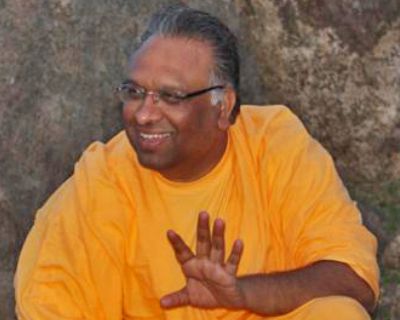“Is violence allowed according to our scriptures?”
Most often, the answer that immediately comes about is this:
“For self-defence, violence is allowed; especially, when Dharma itself is under threat, then violence is allowed, and it even becomes your duty!”
Dull logic, that is!
Suppose I go and kill someone in the name of Dharma protection, and I come back to check whether I have done the right thing. I ask the wise men of my religion whether my actions are in accordance with the scriptures.
There are three ways to look at this scenario.
First, if you have indeed acted according to Dharma, and if Dharma itself was behind your action, then how can you have a doubt? What is the need to verify it? The very fact that you seek verification indicates a gap between your action and Dharma, and hence, it indeed could be Adharma! Going further, besides the experience of the gap, you also feel guilty; you now feel you needn’t have seized matters into your hand, that you could have been a little more patient, or that you needn’t have fallen for the urgings of the people around, then that very experience of guilt is a clear indication that your action is not according to Dharma.
Second, say you don’t experience any doubt at all, even many days after your action. No doubt. No verification. No seeking authentication from the scriptures, and so on. Can that be an affirmation that you were in Dharma? Or that Dharma itself acted through you? Isn’t this the logic of the brute? Isn’t this the logic of Hitler? ‘Within me, I didn’t feel having done a wrong; hence, it wasn’t wrong.’
Then, what is the way to find out? Like Aśoka, who visited the battlefields of Kalinga, go back to what you have destroyed or killed, and check what happens within. In the face of the sorrow and grief you have wreaked, in the face of the torture you have inflicted, is your conscience clear? Why don’t you go through that ‘Brute test’? If you are a man who seeks family, and if your violence has destroyed a family, you will collapse when you see that! If you are a man who wants to teach a lesson to a community, then please go back to see whether the lesson has been learnt; if you actually see that the lesson has not been learnt, and that the other side is intent on _teaching you a lesson now_, then something is indeed wrong, isn’t it? You set out to teach a Dharmic lesson to someone who doesn’t understand Dharma, and once the lesson has been taught, Dharma should take over, right? If, at the end of it all, you find yourself going to teach him Dharma again and again, and he is also doing the same, then who is supposed to learn Dharma here? You get the farce, don’t you? Something is really wrong here!
When you resort to violence in the name of Dharma, then Adharma must end. When Kṛṣṇa moves, the phenomenon initiated by Kamsa or Jarāsandha ends, and along with it they too end. That is the real test. And, this is not because of power or strength; Kṛṣṇa was hardly strong either physically or militarily. But, his sense of Dharma was clear and laser-sharp. If Adharma doesn’t end, but if your vigilance about how Adharma asserts itself turns hawk-like, if your preparations to deal with it increase, and you are ready to resort to violence at the slightest provocation, then it only means that Adharma has not ended. If Adharma hasn’t ended, then what you called as Dharma is not Dharma at all in the first place. Which means you shall face the wrath of cosmic order, and you will be punished for your deeds. Ok! Let us say I am willing to be punished. Then, the whole thing is in transition, isn’t it? Until Adharma acquiesces completely, I can never call what I did as Dharma! In a sense, one is seeking Adharma to authenticate Dharma, right?
You could have a different argument. You could say it is a long-drawn process. If you have begun a process of Dharma and you think that Adharma will take some time to be eliminated or stilled, then as long as your process lasts, you are under probation; the Gods are waiting for your interpretation of Dharma to emerge fully. If your interpretation of Dharma prevails, and you return triumphant, then cosmic order is willing to consider your interpretation of Dharma. In other words, just because you have successfully put down something, you haven’t yet established Dharma. You have to wait for God’s verdict! You have merely put forth your interpretation of Dharma in front of the Gods! You can’t yet consider your-self Dharmic, just because you won. Your case is under consideration, and the Gods are yet to deliver their verdict!
A sincere seeker of Dharma is one who is keen to listen to that verdict of the Gods. Which means, while he becomes acutely aware of the rise of Adharma here, simultaneously, he is also aware that he doesn’t have the power to decide what Dharma or Adharma is by him-self, and realises that the _Gods alone decide what Dharma is_. And, when the Gods pronounce, the verdict may very well condemn you as Adharma itself! It can be too traumatising for you then! All along, you considered yourself as the upholder and fighter for Dhar-ma, and the Gods have pronounced you as very much belonging to the camp of Adharma! In effect, the pronouncement indicts you as no different, either in character or belief, from what you set out to kill!
_Are you ready for this game, sir?_ You are allowed to do what you want here, erect that which you think is Dharma, organise and pull it off successfully, but you still have no pow-er to pronounce what you erected as Dharma ever! You have to await God’s verdict. And, when God pronounces the verdict—of course, he will speak from within you alone—you could be declared as a person who actually did something to restore Dharma, or you could be cast aside as someone who indulged in Adharma, deviously interpreting it as Dharma to cover yourself! Which means you are now no different from what you set out to kill in the first place!
Please remember! Matters of right and wrong, matters of Dharma and Adharma cannot get quickly decided because you felt strongly about something. Even if a Swami or a confident Guru, who chants “Jai Shriram”, sends you out to battle, you won’t be spared of this inner verdict. You know the story of Valmiki, don’t you?
When it comes to pronouncements of what is right and what is wrong, what is Dharma and Adharma, you are entirely on your own. And, you will receive the report card, verdict, blessing or admonishment, custom-made within you. To that voice, you can’t say that this Swami told you to do this, or that leader told you to do that. You are individually account-able to Dharma! Period.
Therefore, remember you are all alone on this. No one shall ever save you. This is directly between you and God. What you seize direct control of, you are directly accountable for it. When it comes to Dharma, Satya, and Ṛta, you are entirely alone. You are a victim of cosmic forces, and you are a willing student of it too.
Why would such a willing student of Dharma and Ṛta ever take to violence? Wouldn’t he be interested in comprehending the eternal order, rather than wasting all efforts in resurrect-ing, again and again, an order that keeps failing?








